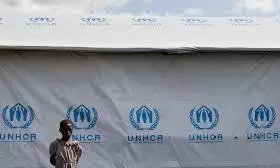
UN slashes aid targets amid unprecedented global funding shortfall
text_fieldsThe United Nations has announced a dramatic scale-back of its global humanitarian efforts, citing what officials describe as the “deepest funding cuts ever.”
Tens of millions of vulnerable people are now at risk, as the organisation grapples with a widening gap between needs and resources.
In a stark revision of its financial appeal, the UN’s Office for the Coordination of Humanitarian Affairs (OCHA) said it is now seeking $29 billion in aid funding for 2025 — a sharp drop from the $44 billion originally requested in December.
The updated figure reflects a “hyper-prioritised” plan that narrows its focus to only the most urgent crises.
Adding to the crisis, the UN’s refugee agency, UNHCR, confirmed it would be eliminating approximately 3,500 positions, a reduction of 30 percent in staffing costs, due to plummeting donor support. Many temporary workers have already been let go.
The funding crisis follows a significant reduction in foreign aid by the United States — historically the UN’s largest donor — after Donald Trump returned to the presidency in January. The cuts have sent shockwaves through the humanitarian sector, severely affecting vaccination campaigns, emergency response, and the fight against HIV/AIDS.
Other donor countries, facing economic uncertainty, have also reduced their contributions. OCHA chief Tom Fletcher didn’t mince words: “Brutal funding cuts leave us with brutal choices… All we ask is one percent of what you chose to spend last year on war.”
Fletcher previously visited a hospital in Kandahar, Afghanistan, where he issued a sobering warning: “The impact of aid cuts is that millions die.”
As of mid-2025, the UN has received just $5.6 billion — only 13 percent of its initial $44 billion goal. Originally, the aid plan aimed to support nearly 190 million people across 70 countries. Even at full funding, the plan admitted that 115 million others in need would still go without assistance.
“We have been forced into a triage of human survival,” Fletcher said. “The mathematics is cruel, and the consequences are heartbreaking.”
Going forward, the UN will concentrate aid efforts on those in the most desperate situations. “Too many people will not get the support they need, but we will save as many lives as we can with the resources we are given,” he added.
Meanwhile, the UN’s Food and Agriculture Organization (FAO) and World Food Programme (WFP) issued a joint alert identifying 13 global hunger hotspots, warning of escalating famine conditions.
Sudan, Gaza, South Sudan, Haiti, and Mali have populations “already facing famine, at risk of famine or confronted with catastrophic levels of acute food insecurity,” the report noted. Yemen, DR Congo, Myanmar, and Nigeria are listed as high-risk zones needing immediate intervention, along with Burkina Faso, Chad, Somalia, and Syria.
“This report is a red alert,” said WFP Executive Director Cindy McCain. “Without funding and access, we cannot save lives. Urgent, sustained investment in food assistance and recovery support is crucial as the window to avert yet more devastating hunger is closing fast.”
The impact on the UNHCR is particularly severe. The U.S. previously contributed over 40 percent of the agency’s budget — around $2 billion annually. UNHCR chief Filippo Grandi, addressing the UN Security Council in April, acknowledged that the agency now faces severe financial constraints.
Despite the refugee population doubling over the past decade — now surpassing 122 million people globally — UNHCR expects to end 2025 with roughly the same level of funding as ten years ago.























